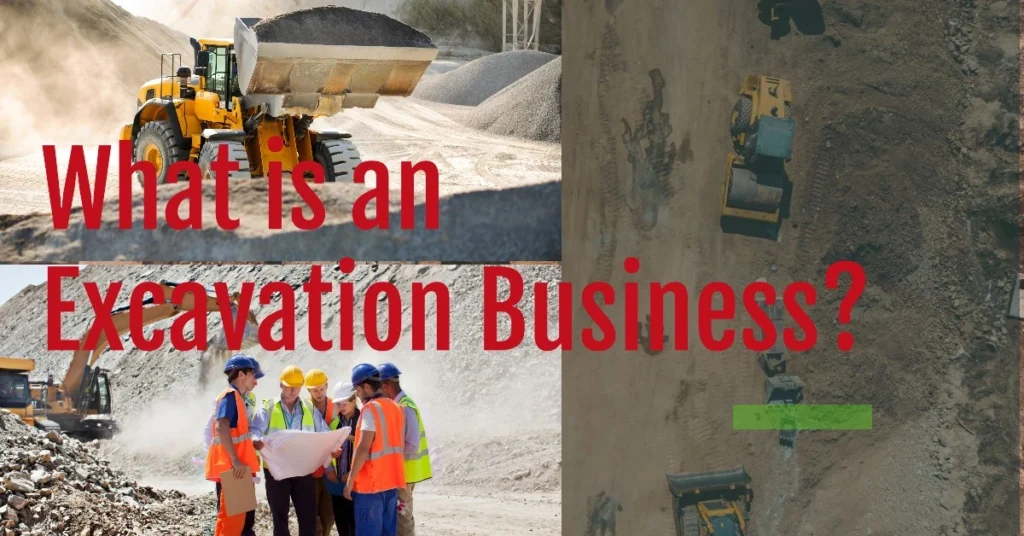Starting an excavation business in the thriving construction industry can be an exciting entrepreneurial opportunity, but also comes with substantial challenges. Understanding what you need to start an excavating business is crucial.

Before diving into excavation company formation, aspiring contractors must thoroughly understand all aspects of this complex business undertaking. From acquiring essential heavy equipment and licenses to devising an airtight business plan and funding strategy, many key steps and considerations are involved in launching a successful excavation venture.
This article will provide insightful guidance on core requirements like licensing, equipment purchases, business pro planning, funding, brand building, and more to set you on the path to building a prosperous excavation company. With diligent preparation and research, your excavation business can flourish amidst the lucrative construction sector.
What is an Excavation Business?
An excavation business provides excavation, earthmoving, and grading services for construction projects. This involves using heavy equipment like excavators, bulldozers, and loaders to dig, move, and level earth on construction sites. Excavation companies work on projects like building foundations, trenching for utilities, landscaping, mining, and more. They are a vital part of the construction industry ecosystem.

The Different Types of Excavation Businesses
When starting an excavation company, one of the first decisions is choosing your focus area. There are several types of excavation businesses to consider:
- General excavation companies work on all types of excavation projects from home building to commercial construction. This offers variety but requires a wider range of equipment and capabilities.
- Trenching and utilities excavation businesses specialize in digging trenches to install underground power, water, gas, and telecom lines. This needs specific trenching knowledge and equipment.
- Residential excavators focus just on excavation work for housing and other smaller building projects. This allows concentrate your services on homeowners.
- Land excavation companies clear and prep land for developments like golf courses, parks, and new buildings. Environmental impact studies and permits may be required.
- Road excavation businesses provide excavation services for constructing new roads and highways which requires coordinating with government agencies.
The Benefits of Starting an Excavation Business
Breaking into the lucrative excavation industry as an entrepreneur has many advantages:
- Opportunity to capitalize on the growing construction sector as infrastructure and housing expands.
- Ability to operate with minimal overhead if you already own excavation equipment.
- Potential for high-profit margins on excavation work that requires specialized heavy equipment.
- Flexibility to choose your workload and clients as a business owner.
- Ability to expand your range of services over time by adding new equipment and capabilities.
- Chance to work outdoors instead of being stuck in an office all day.
- Satisfaction of seeing tangible results from your work on excavation projects.
The Challenges of Starting an Excavation Business
While an excavation business can be highly rewarding, there are also considerable challenges to navigate:
- Requires major capital investment for purchasing expensive heavy equipment before you can even begin operating.
- Seasonal nature of construction leads to unpredictable workflow and cash flow year-round.
- Managing wear and tear, maintenance, and breakdowns of heavy equipment takes experience.
- Staying compliant with licensing, permits, safety standards, and regulations involves a lot of paperwork.
- Each excavation job comes with unique site conditions, access issues, labor needs, and other complexities to address.
- Establishing a reputation and client base takes a long time for a new company.
The Steps Need To Start an Excavating Business

Conduct In-Depth Market Research
Before launching an excavation business, it is crucial to thoroughly research the construction industry and competitive landscape, including:
- Analyze the current market dynamics and growth projections for the excavation industry. Particularly in your local area and for the services you plan to offer.
- Investigate trends in construction sector spending, housing starts, and commercial projects that require excavation work.
- Research excavation companies in your region and see if there is room in the market for a new entrant.
- Examine their service offerings and pricing to determine how you can position yourself competitively.
- Understand customer needs and preferences to tailor your business strategy and services.
- Evaluate the impact of industry regulations and safety standards on operational planning and execution.
- Understand the cyclical nature of the construction sector and how you can build financial reserves during busy seasons to survive winter slowdowns.
- Consider joining organizations like the National Utility Contractors Association to gain excavation business insights.
Gathering market intelligence will enable the creation of a differentiated and financially viable excavation business aligned with industry dynamics.
Create a Realistic Business Plan
Every new excavation business needs a comprehensive business plan. This is your roadmap and helps determine viability before major investments:
- Outline the business model for your excavation company, based on market research, and realistically estimate your potential client base and revenue.
- Address legal structure choices, explaining their implications for liability, taxation, and operational flexibility.
- Create financial projections covering overhead, equipment purchases, payroll, insurance, maintenance, fuel, supplies, etc.
- Outline your target customers and niche like residential or utility excavation.
- Describe your marketing plan for winning new business.
- Determine startup funding needs and sources such as business loans or investors.
- Build contingencies for unexpected costs and cash flow interruptions.
- Establish policies for pricing, customers, employees, equipment maintenance, and safety.
Writing a pragmatic excavation business plan grounded in thorough research enables you to launch with eyes wide open. Lacking a plan risks financial disaster once external realities impose themselves.
Determine the Business Structure
Choosing the right legal structure is a critical decision when starting an excavation business. Evaluate different business structures:
- Sole Proprietorship: Sole proprietorships offer simplicity but expose your assets to liability.
- Partnership: Partnerships allow the sharing of startup costs but introduce potential management challenges.
- LLC, and Corporation: A limited liability company (LLC) separates your personal and business assets for liability protection while allowing pass-through taxation. Corporations limit liability and allow selling stocks but require extensive recordkeeping.
Carefully weigh these options – an excavation business’s heavy equipment and workplace hazards pose substantial liability risks. Discuss your situation with a business lawyer to determine the best structure. Also factor in impacts to taxes, paperwork, and ease of dissolution down the road before registering your business.
Get Required Licenses & Permits
Securing the right licenses and permits is a cornerstone of launching a successful excavation business. This step is crucial not only for legal operations but also for establishing credibility in the construction industry.
- Contractor’s License: Understand the requirements and process for obtaining a contractor’s license, which is essential for legally operating an excavation company.
- Commercial Driver’s License (CDL): If your business involves operating heavy machinery, a CDL may be necessary. Discuss the types of equipment that require a CDL and the process of acquiring one.
- Business Licensing: Navigate through the process of business registration and obtaining a general business license. This includes understanding local permitting and state licensing requirements.
- Tax IDs and Sales Tax Compliance: Cover the importance of obtaining a tax identification number and adhering to sales tax compliance regulations.
- Federal Compliance: Address the need for compliance with federal regulations, especially when dealing with interstate commerce or federal contracts.
Adhering to licensing and permitting requirements is crucial for legal compliance and smooth business operations. An organized approach prevents overlooked requirements that could derail your launch.
Obtain Financing and Purchase Equipment
Acquiring essential equipment represents one of the largest upfront investments when starting an excavation business. Carefully assess your financing and equipment acquisition strategy.
Financial Strategy and Funding
- Startup Funding: Explore various avenues for startup funding, including loans, grants, and private investors. Highlight the importance of a solid business plan in securing these funds.
- Business Investment: Discuss the significance of wise investment decisions in the context of business growth and brand building.
- Financial Strategy and Pricing Strategy: Develop a comprehensive financial strategy that includes budgeting, pricing, and managing operating costs.
Financing Options
- Business loans, equipment leasing, manufacturer financing
- Strong business plan and finances assist with favorable rates
- Time purchases with a project start date to quickly generate cash flow
Equipment Acquisition
- Choosing the Right Equipment: Delve into the selection of essential excavation equipment like excavators, bulldozers, loaders, and trucks.
- New vs. Used Equipment: Provide a comparison of purchasing new versus used equipment, considering factors like cost, longevity, and maintenance.
New vs. Used Excavation Equipment Cost Comparison
| Equipment | New Cost | Used Cost |
|---|---|---|
| Full-Size Excavator | $100,000+ | $30,000+ |
| Bulldozer | $80,000+ | $25,000+ |
| Front End Loader | $150,000+ | $40,000+ |
| Dump Truck | $100,000+ | $20,000+ |
Doing diligent research and planning for major equipment purchases and financing will enable starting operations with an optimal excavation fleet while controlling your largest startup costs.
Get Insurance & Bonds
Insurance and bonds are crucial for risk management in the excavation business. Key coverages needed include:
- Liability insurance to cover property damage, bodily injury, and completed work.
- Workers’ compensation insurance for on-the-job employee injuries.
- Surety bonds to meet requirements for public sector jobs.
- Inland marine insurance for owned heavy equipment.
- Business interruption insurance for loss of income from disasters.
Work with an insurance broker experienced in the excavation industry to secure appropriate policies with sufficient coverage levels for your operations. Also, factor in costs when creating financial projections. Having proper insurance and bonds demonstrates credibility and protects your business.
Hiring and Crew Management
A trained, experienced team is invaluable for an excavation business. When hiring, look for:
- Equipment operators with extensive hands-on experience operating your specific machines. Verify any required licensing or certifications.
- Crew members with strong safety mindsets.
- Personnel is comfortable working long outdoor hours in all weather conditions.
- Labourers capable of supporting projects physically.
- Project managers competent in excavation techniques, materials, and regulations.
Implement a structured training program focused on your operating procedures, safety protocols, and compliance policies. Emphasize hazard awareness, protective equipment, and proper use of machines. Enforce zero tolerance for shortcuts.
Foster open communication and feedback loops with crews. Track each member’s competencies and provide advancement opportunities through cross-training.
Keep crews motivated with competitive pay, performance bonuses, and a positive work culture. Maintain safety standards through ongoing training and oversight of operations.
Managing workloads, schedules, and crews efficiently is vital for operational success and profitability.
Establish Brand Identity & Marketing Materials
Promoting your excavation business through marketing and branding will steadily attract clients. Essential elements include:
- A professional website showcasing past projects and capabilities.
- Search-optimized (SEO), online ads and directories.
- Networking with general contractors, developers, and architects.
- Solid recommendations through quality workmanship.
- Well-designed brochures, business cards, email templates, etc.
- Active social media profiles highlighting company culture and expertise.
- Attending trade shows and joining industry associations.
- Tagged company vehicles, signage, and job site visibility.
Consistent branding that conveys reliability, quality, and industry expertise helps establish a strong excavation company identity. This, combined with targeted digital and in-person marketing, generates new business.
Implement Safety Protocols
Due to heavy equipment and hazardous conditions, safety is paramount in excavation businesses. Key protocols include:
- Thorough training on equipment, materials, and safety procedures
- Rigorous compliance enforcement
- Providing proper protective gear and equipment
- Regular site inspections and hazard awareness reinforcement
- Emergency response plans
- Accident investigation and prevention programs
- Zero tolerance for skipping safety steps
Making safety an integral part of operations and culture helps prevent injuries, protect crews, and avoid costly lawsuits.
Manage Operations Efficiently
Smooth operations are vital for profitability in the excavation business. Best practices include:
- Use project management software and checklists
- Schedule projects and crews optimally
- Track equipment hours and maintenance needs
- Monitor costs and billings in real-time
- Keep communication open with crews and clients
- Have standby equipment and staffing contingencies
- Streamline administrative processes
- Negotiate volume discounts on supplies
- Ensure timely billing, collections, and payroll
Efficient management of workflows, assets, costs, and processes allows maximizing productivity and minimizing overhead. This leads to competitive project bids, profitability, and business growth.

Tips for Success in the Excavation Business
Success in the excavation business hinges on a blend of strategic business planning, market analysis, and operational excellence. Let me pass these learnings on to aspiring excavation entrepreneurs:
- Make safety your top priority from day one: Rigorously implement training, protocols, and oversight to protect your greatest asset – your crew.
- Choose partners and mentors carefully: Align yourself with excavators who share your commitment to integrity, rather than just chasing quick profits.
- Build reserves before leaping: Have at least 6 months of operating costs ready as a cushion against slow periods and unexpected expenses.
- Invest in quality over quantity when acquiring equipment: Smart equipment acquisition and financial strategy can make or break your business. Consider both new and used options for heavy equipment.
- Sweat the small stuff on every job to build a reputation for excellence: Your attention to detail will differentiate you.
- Foster trusted relationships with developers, architects, and real estate agents: Become known as their reliable excavator through transparent communication and underpromising.
- Keep operations lean and costs in check: Monitor workflows efficiently without compromising compliance or maintenance.
- Make safety protocols and training an integral part of your operations and culture: Crew retention will improve significantly.
- Continuously expand your knowledge base and capabilities: Seek innovative, value-adding solutions for customers.
- Embrace Technology: Utilize digital tools for operational planning, project management, and marketing. It streamlines processes and enhances efficiency.
- Network and Collaborate: Building relationships within the construction sector can lead to new opportunities and valuable partnerships.
With diligence, integrity, and smart decisions, your excavation venture can gain a strong foothold and thrive for years to come.
At End
Starting an excavation business offers immense potential, but requires diligent planning and preparation. This article has provided insights into core steps like obtaining licenses and financing, buying equipment, hiring crews, implementing safety protocols, and efficiently managing operations. While launching an excavation company poses major challenges, the rewards of entrepreneurship in this thriving industry make the effort worthwhile.
As you embark on your excavation venture, remember to conduct in-depth research, create pragmatic business pro planning, invest wisely in your capabilities, and deliver excellence on every job. Keep crew safety paramount throughout your operations. Build trusted relationships with clients through transparency and consistent quality. With dedication and perseverance, your excavation business can gain a reputation as a reliable, expert service provider in the construction industry.
The insights covered in this article aim to provide an actionable foundation for aspiring excavation entrepreneurs. Feel free to reach out for any specific guidance as you progress on your exciting journey to launching a successful excavation company. With the right strategic approach, your excavation venture can thrive for years to come.

